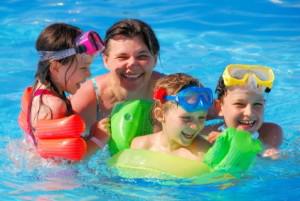 Swimming is great fun, but recreational waters can be a place to pick up illnesses.
Swimming is great fun, but recreational waters can be a place to pick up illnesses.
The Centers for Disease Control (CDC), in a recent press release asks that we all do our part in keeping our recreational water safe.
The CDC suggests following these healthy swimming steps to protect you, your family, and other swimmers from recreational water illnesses.
Three Steps for All Swimmers – Keep germs from causing recreational water illnesses:
- Don’t swim when you have diarrhea. You can spread germs in the water and make other people sick.
- Don’t swallow the pool water. Avoid getting water in your mouth.
- Don’t assume that pool water is germ free because the water is treated with chlorine
- Practice good hygiene. Shower with soap before swimming and wash your hands after using the toilet or changing diapers. Germs on your body end up in the water.
Three Steps for Parents of Young Kids – Keep germs out of recreational water:
- Take your kids on bathroom breaks or check diapers often. Waiting to hear “I have to go” may mean that it’s too late.
- Change diapers in a bathroom or a diaper-changing area and not at poolside. Germs can spread in and around the pool.
- Wash your child thoroughly (especially the rear end) with soap and water before swimming. Invisible amounts of fecal matter can end up in the pool.
Michele Hlavsa, CDC, states.”“You can get gastrointestinal infections, viral meningitis, ear infections – also known as swimmer’s ear – but the most common infection is diarrhea from the germs in recreational waters.” Ms. Hlavsa advises, “Don’t swallow the water, or swim with open sores.”
 Swimming is great fun, but recreational waters can be a place to pick up illnesses.
Swimming is great fun, but recreational waters can be a place to pick up illnesses.
